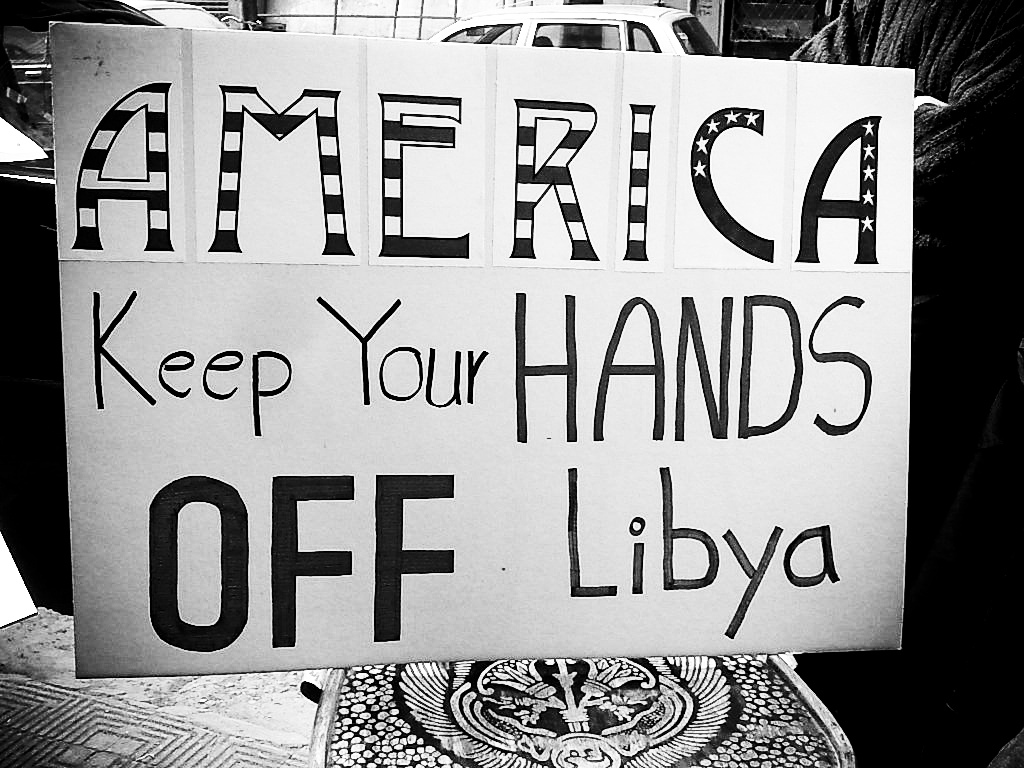
In March 2011, the British Parliament voted to intervene in Libya, opposed by only 15 MPs. Labour ‘left veteran’ Diane Abbott is among those who voted for bombing, as is the current Shadow Defence Secretary Nia Griffith. The legacy of the 2011 NATO war on Libya was thrust back onto the news agenda in May 2017. On 22 May 2017 a British-Libyan, inspired by the Islamic State (IS), carried out an horrific suicide bomb attack at a Manchester pop concert killing 23 people and injuring more than 100. Two days later, 30 people, mainly young children, drowned off the Libyan coast after falling from a small wooden boat carrying 700 people. Together these events illustrate the disastrous legacy of NATO’s war to overthrow the government of Muammar Gaddafi.
Libya devastated
NATO’s 2011 onslaught, in which Britain and France played a major role, devastated a country which once had the highest Human Development Index scores in Africa. John Pilger explains: ‘Nato launched 9,700 “strike sorties”, of which more than a third hit civilian targets. They included fragmentation bombs and missiles with uranium warheads.’1 A September 2016 Foreign Affairs Committee report into the British role in Libya summed up the results of the intervention: ‘political and economic collapse, inter-militia and inter-tribal warfare, humanitarian and migrant crises, widespread human rights violations, the spread of Gaddafi regime weapons across the region and the growth of Isil [IS] in north Africa’. Two rival governments compete for power: the UN backed Government of National Accord in Tripoli, and the National Salvation government in the east – supported by the powerful general of the self-styled Libyan National Army, Khalifa Haftar. In much of the country neither of these bodies has effective control. On 26 May dozens of fighters were killed in clashes between various rival militias in Tripoli. IS and other jihadist groups have a significant presence in Libya.
Under Gaddafi, Libya was a final destination of choice for migrants from all over Africa. Today, with little functioning border control, it is a major exit point for migrants attempting to get into Europe. Human traffickers offer often dangerous services. More than 1,569 migrants have died in the Mediterranean in 2017 so far (International Organisation for Migration, 30 May). The Libyan coastguard has been accused of violently attacking migrant boats and rescue operations, preventing European charities from rescuing migrants and instead returning them to Libya to be locked in dreadful conditions in detention centres (Médecins Sans Frontières, 17 May).
Britain and the LIFG
The connections between the Manchester attack and NATO’s regime-change operation in Libya are clear. The attacker, Salman Abedi, had links to Libyan jihadist groups. Abedi’s father, and according to some sources, Abedi himself, were members of the Libyan Islamic Fighting Group (LIFG) and had fought in 2011 against Gaddafi’s government.2 The history of the relationship between the LIFG and the British state is illustrative of how Britain has long used Islamic fundamentalist groups according to its shifting foreign policy priorities. The US and Britain supported the formation of the jihadist Mujahedin in Afghanistan in the 1980s to overthrow the revolutionary nationalist Najibullah government and weaken the Soviet Union. Libyan veterans of the Mujahedin formed the LIFG in 1990 – other remnants of the Mujahedin had formed Al Qaeda in 1988. In the 1990s the LIFG was supported by Britain in attempts to assassinate Gaddafi, and, following the Libyan government’s response, LIFG members were given asylum in Britain. After the 2001 World Trade Centre attacks, and the subsequent thawing of relations with Gaddafi, the group was proscribed as a terrorist organisation by the UN Security Council, the US and Britain. Abdel Hakim Belhadj, a prominent leader of the LIFG, a Mujahedin veteran who had also fought with the Taliban in Afghanistan, was rendered to Libya on the information of MI6 where he was tortured by the government. Many LIFG members and supporters in Britain, including in south Manchester where the Abedis lived, were under surveillance by the British state. They were subject to control orders, and had had their passports confiscated.
However, as Gaddafi’s government became a NATO target for regime change under cover of the Arab Spring, the British security services’ approach to the LIFG and other Libyan militants quickly shifted. Control orders were lifted in the run-up to 2011, and passports were returned. Middle East Eye (25 May 2017) quotes fighters alleging that their travel from Manchester to Libya was directly facilitated by British security services. In Libya, the LIFG and other ‘rebel’ groups were fighting alongside British covert forces, including the SAS, whilst the Royal Air Force and Navy bombs opened the way to the overthrow of Gaddafi’s government. LIFG members subsequently travelled to Syria to participate in the war against the government of President Bashar Assad. According to French intelligence, Abedi also fought in Syria (The Observer, 28 May). He returned to Britain shortly before carrying out the 22 May attack. Abedi was part of a Libyan Salafist community which had long been known to the British security services. It is clear that the British state was happy to use people like Abedi to fight for their coincident aims in places like Syria and Libya, well aware of their murderous ideology.
In its quest to destroy independent governments, and ensure strategic domination of the crucial regions of the Middle East and North Africa, NATO imperialism has launched murderous wars with disastrous human consequences for millions of people. In pursuing its objectives it has made tacit alliances with other brutal and reactionary forces, creating the contradictions which continue to wreak chaos in the world today.
1. ‘Terror in Britain: what did the Prime Minister know?’, John Pilger (31 May).
2. ‘The Manchester bombing: blowback from British state collusion with jihadists abroad’, Mark Curtis and Nafeez Ahmed (3 June).
For a full history of Britain’s support for jihadists see: Secret Affairs: Britain’s collusion with radical Islam, Mark Curtis (2012).
Toby Harbertson
Fight Racism! Fight Imperialism! 258 June/July 2017




